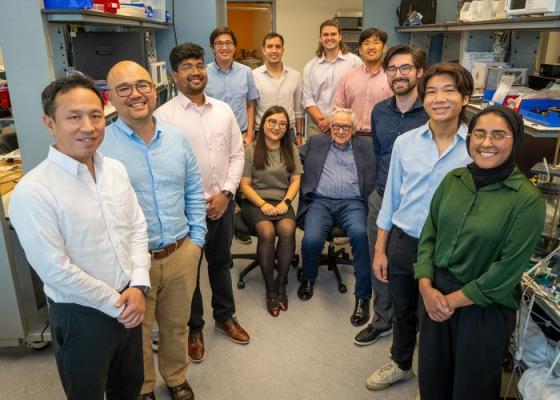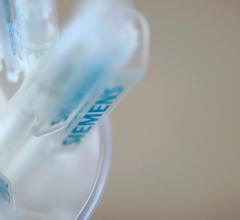
Through a new four-year, $7.8 million Department of Defense grant awarded to the Georgia Institute of Technology (Georgia Tech), Yaxin Wang, PhD (seated left), O.H. Frazier, MD (seated right), and their colleagues in The Texas Heart Institute’s Innovative Device Engineering & Applications (IDEA) Lab will collaborate with researchers at Georgia Tech, North Carolina State University and Rice University to develop a novel LVAD as an alternative treatment option to cardiac transplantation and long-term support in end-stage heart failure. Image courtesy of The Texas Heart Institute 2024
March 8, 2024 — The Texas Heart Institute, Georgia Institute of Technology (Georgia Tech), North Carolina State University (NC State), and Rice University will collaborate to develop a novel left ventricular assist device (LVAD) as an alternative treatment option to cardiac transplantation and long-term support in end-stage heart failure. The research is funded by a four-year, $7.8 million grant awarded to Georgia Tech by the United States Department of Defense Congressionally Directed Medical Research Programs (CDMRP) as part of the agency’s call for the development of less invasive treatment technologies for cardiovascular conditions associated with cardiomyopathy. The Texas Heart Institute will receive approximately $2.94 million from the award to fund its role in the research effort.
Nearly seven million people in the U.S. suffer from heart failure, and there are approximately 400,000 heart-failure-related deaths in this country each year. Patients with heart failure often experience reduced mobility, quality of life and ability to work; the disease also represents a significant public health care burden. Heart failure is a progressively worsening disease, and there is no effective medicine to treat end-stage heart failure. Cardiac transplantation, the only option for many patients, is severely restricted by the limited availability of donor hearts. As an alternative therapeutic option, LVAD heart pumps have been implanted to help patients with end-stage heart failure sustain blood circulation in the body.
However, there are shortcomings associated with LVAD implantation: complications include infection, blood clotting (thrombosis), stroke and bleeding. Many of these problems are related to blood damage caused by the implanted devices and must be treated through invasive surgeries. Additionally, current LVADs use drivelines placed through the skin (i.e., percutaneous) to power the device; these drivelines can cause infection, leading to rehospitalization and additional surgeries. Even if there is no infection, a driveline significantly reduces the mobility of patients, thereby decreasing their quality of life.
The goal of the new research project is to address several of these shortcomings associated with current LVADs, making LVAD therapy more effective and less invasive. The collaborators propose device design improvements that will reduce blood damage, blood clot formation, and driveline complications such as infection and mobility limitations. The investigators will leverage an interdisciplinary approach involving four research groups with complementary technical expertise and a panel of cardiologists from the U.S. Department of Veterans Affairs. The teams will combine innovative engineering designs, antithrombotic slippery hydrophilic (SLIC) coatings, wireless power transfer systems, magnetically levitated driving systems and preclinical device testing to achieve their goal.
The overall effort will be led by principal investigator Lakshmi P. Dasi, PhD, Rozelle Vanda Wesley Professor in the Wallace H. Coulter Department of Biomedical Engineering and director of the Cardiovascular Fluid Mechanics Laboratory at Georgia Tech. He is an expert in prosthetic heart valves and cardiovascular biomechanics, biomaterials and devices. Dr. Dasi's group will use computer simulations to redesign LVAD components to reduce blood damage and clotting risk. Blood clots often form where the blood enters the LVAD because the blood flow slows down there and becomes disordered (termed stasis). A novel flexible stented blood inlet will conform to the shape of the patient’s heart to prevent flow stasis and clotting. The stent material will encourage the growth of the patient’s own endothelial cells into the inlet, further reducing the risk of clot formation. The researchers also will design unique flexible rotors and casings that will reduce blood damage.
Arun Kumar Kota, PhD, associate professor in the Department of Mechanical and Aerospace Engineering at NC State, is an expert in bio-inspired and biocompatible surfaces and biomaterial science. Dr. Kota's research group will use novel, slippery SLIC coatings based on ice-like hydration layers to reduce the friction between the blood and the LVAD components to prevent clot formation. The coatings should keep blood proteins involved in the clotting process from sticking to the coated surface, further reducing clotting risk. The coating will be applied to the LVAD pump’s more blood-compatible impeller rotor currently under design by Dr. Dasi’s group.
Joseph R. Cavallaro, PhD, professor in the departments of Electrical and Computer Engineering and Computer Science at Rice, is an expert in very large-scale integration (VLSI) systems design and signal processing, wireless communication and computer engineering systems. To eliminate the need for a driveline that penetrates the skin, Dr. Cavallaro's group will develop an external power source — a wearable, rechargeable battery — and a transmitter to wirelessly power the implanted pump. The system also will include a communication link for the centrifugal pump to provide feedback to the external power system.
Co-investigator Mehdi Razavi, MD is a clinical electrophysiologist and director of the Electrophysiology Clinical Research & Innovations department at The Texas Heart Institute and an adjunct associate professor in the departments of Bioengineering and Electrical and Computer Engineering at Rice. He and his team will collaborate with Dr. Cavallaro’s group to develop computer algorithms to monitor the electrical conduction of the heart and modify LVAD pump operation as needed.
O.H. Frazier, MD, director of the Center for Preclinical Surgical & Interventional Research at The Texas Heart Institute, is a cardiothoracic surgeon who has made ground-breaking contributions to the field of mechanical circulatory support and the treatment of patients with heart failure. Dr. Frazier's team, including co-investigator Yaxin Wang, PhD, director of the Innovative Device & Engineering Applications (IDEA) Lab at The Texas Heart Institute, and her group will design and evaluate a new LVAD drive system with magnetically levitated bearings. The non-contact bearing system will decrease the risk of blood clotting and blood damage. The group will test the overall SLIC LVAD system developed by the greater collaborative team, in a lab-bench-based blood flow loop and in preclinical models, to measure the LVAD’s blood compatibility and overall performance.
When completed and evaluated for use in patients through clinical trials and the regulatory approval process, this novel LVAD could provide a much less invasive form of long-term support for patients with heart failure, benefiting the military, veterans and the public. The SLIC LVAD also has the potential to greatly improve the quality of life of patients who need circulatory support. Importantly, many of the innovative technologies developed during the project, such as the wireless power transfer for medical devices and the coatings to prevent blood clotting, can be translated into other applications.
Joseph G. Rogers, MD, heart failure specialist and president and CEO of The Texas Heart Institute, said, “The Texas Heart Institute continues to be a leading center for innovation in mechanical circulatory support systems. This award will further the development and testing of the SLIC LVAD, a device intended to provide an option for a vulnerable patient population and another tool in the armamentarium of the heart failure teams worldwide.”
The work was supported by the Assistant Secretary of Defense for Health Affairs endorsed by the Department of Defense, in the amount of $7,836,599 through the Department of Defense Health Program, Congressionally Directed Medical Research Programs, Peer Reviewed Medical Research Program, Focused Program Award under Award No. HT94252310663. Opinions, interpretations, conclusions, and recommendations are those of the author and are not necessarily endorsed by the Assistant Secretary of Defense for Health Affairs or the Department of Defense.
For more information: www.wtexasheart.org


 November 14, 2025
November 14, 2025 









